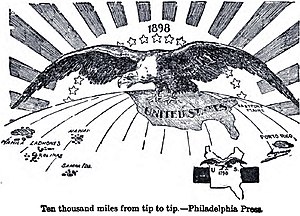I Will Bow and Be Exceptionalist
Posted in The Gnovis Blog
My sixth grade English teacher always told us “Good manners are better than good grammar.” On an Asian Pacific tour this week, President Obama exhibited what it means to have “good manners” and in the process drew the fire of conservative grammar regarding the infamous bow seen round the world. Conservative media pundits began the process of stating that an American president should never bow to anyone and this show of humility is just further evidence that Obama sees America as  one nation among many – not the dominant leader of the world. In other words, conservatives were attacking Obama’s commitment to American exceptionalism.
one nation among many – not the dominant leader of the world. In other words, conservatives were attacking Obama’s commitment to American exceptionalism.
Former Vice President Dick Cheney stated in a recent Politico article by Mike Allen, “There is no reason for an American president to bow to anyone. Our friends and allies don’t expect it, and our enemies see it as a sign of weakness.” Wow, pretty strong words from the man who articulated past policies on ‘enhanced interrogation.’ I guess the bully on the playground never shows weakness and instead projects his strength by waterboarding others.
American exceptionalism is the idea that the United States is a special nation, blessed by God to save civilization from itself. It has been embodied in many forms throughout the centuries of America’s existence – Manifest Destiny to the Shining City on the Hill. This idea of exceptionalism has led the country to “civilize” and “C
When media outlets interviewed conservative commentators about the Obama bow, the common ideal was that Obama has eskewed American exceptionalism in favor of a relativist view of the world where America is no longer special, no longer shining, and no longer the go-to-guy on the superpower block. For example, an April article in the Wall Street Journal reported “Obama Diverges from American Exceptionalism.” After G20 comments early this year that “I believe in American exceptionalism, just as I suspect  that the Brits believe in British exceptionalism, and the Greeks believe in Greek exceptionalism,” President Obama was labeled as a relativisit bent on bringing the U.S. off its high horse. Michael Barone in responding to the G20 phrase Obama uttered stated, “And what of America’s special place in the world? One cannot imagine Presidents Roosevelt, Truman, Kennedy, Eisenhower or Reagan uttering such sentiments.”
that the Brits believe in British exceptionalism, and the Greeks believe in Greek exceptionalism,” President Obama was labeled as a relativisit bent on bringing the U.S. off its high horse. Michael Barone in responding to the G20 phrase Obama uttered stated, “And what of America’s special place in the world? One cannot imagine Presidents Roosevelt, Truman, Kennedy, Eisenhower or Reagan uttering such sentiments.”
Obama’s comments and the concerns over them strike at the heart of American national identity and the constructed reality of the ‘Shining City on the Hill’ mindset that permeates aspects of America’s thought processes. At the close of his speech to the Republican National Convention in 1980, Ronald Reagan stated , “Can we doubt that only a Divine Providence placed this land, this island of freedom, here as a refuge for all those people in the world who yearn to breathe free?” Reagan is actually a good example of American exceptionalist rhetoric in everyday discourse. The question is – does Obama really eschew exceptionalism in his words and actions?
I am not an expert on protocols regarding foreign dignataries and nobility so I will go right to the language. My preliminary research on this issue has shown that, surprisingly, President Obama’s rhetoric evokes American exceptionalism as opposed to eschewing it. Here is one example (I would caution that this does not indicate a representative nature of his language. More analysis is needed).
During a speech on the “Progress of the American Economy” at Georgetown University in April, President Obama articulated a parable from Jesus’ Sermon on the Mount regarding a house built on a rock versus a pile of sand. He stated,
“But from where we stand, for the very first time, we are beginning to see glimmers of hope. And beyond that, way off in the distance, we can see a vision of an America’s future that is far different than our troubled economic past. It’s an America teeming with new industry and commerce; humming with new energy and discoveries that light the world once more. A place where anyone from anywhere with a good idea or the will to work can live the dream they’ve heard so much about. It is that house upon the rock. Proud, sturdy, and unwavering in the face of the greatest storm.”
Nothing special here. Until it is compared with Ronald Reagan’s Farewell Address where he articulates his vision of the ‘Shining City on the Hill.’ Reagan says,
“I’ve spoken of the shining city all my political life, but I don’t know if I ever quite communicated what I saw when I said it. But in my mind it was a tall, proud city built on rocks stronger than oceans, windswept, God-blessed, and teeming with people of all kinds living in harmony and peace; a city with free ports that hummed with commerce and creativity. And if there had to be city walls, the walls had doors and the doors were open to anyone with the will and the heart to get here. That’s how I saw it, and see it still.”
Comparing the two, there are numerous similarities. The first large (but implicit) one is that Reagan’s reference to the Shining City comes from John Winthrop, a Pilgrim who gave a speech using the ‘Shining City’ in 1630. Winthrop was citing Jesus’ Sermon on the Mount, just a different chapter from where Obama pulled his ‘house on a rock’ parable. There are other similarities in verb use and the imagery created. Scholars call this intertextuality because the texts mirror one another. In other words, they are applying the same context, the same meaning with similar words and different overarching labels. Reagan’s America is a Shining City while Obama’s America is a House on a Rock. Obama’s is not as flashy, but is as equally exceptionalist as Reagan’s.
For me, further review is needed before I can agree with the conservative “media consensus” that President Obama has disavowed American exceptionalism. His rhetoric says one thing and his actions, potentially another.
